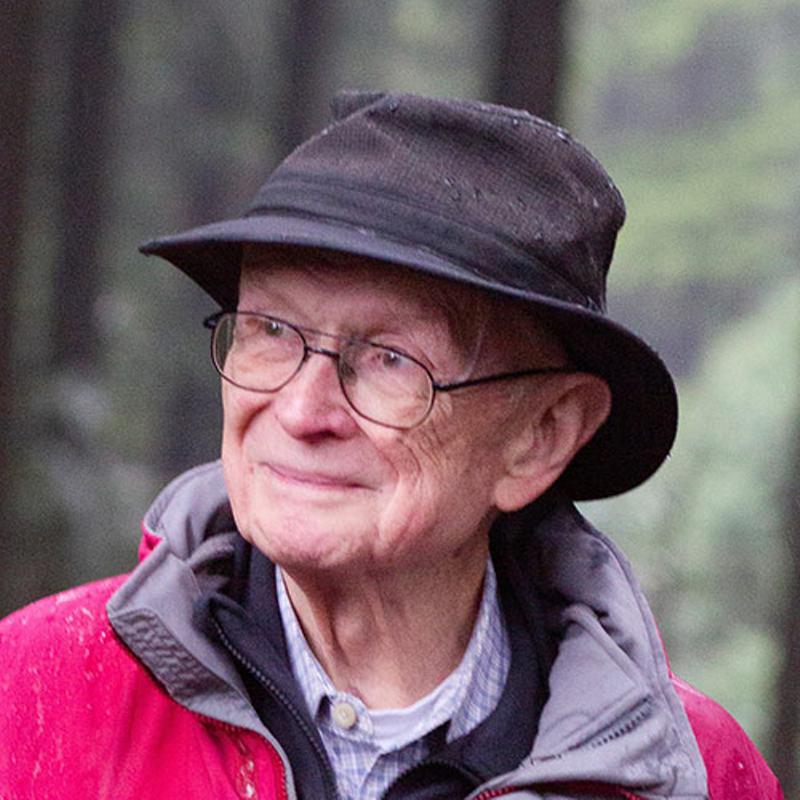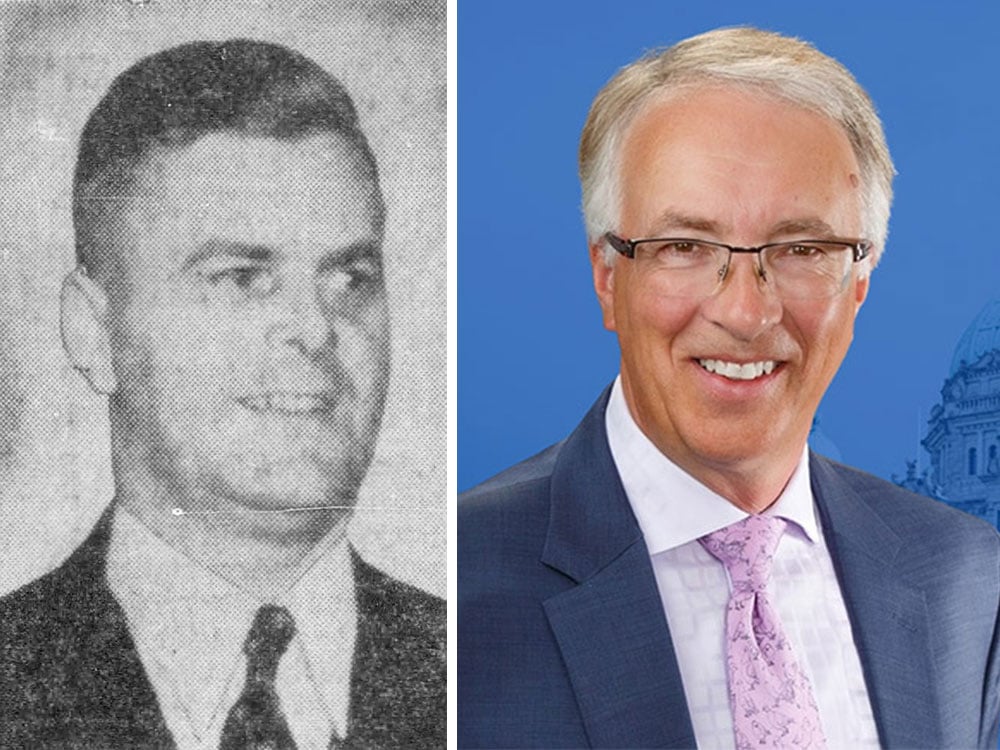Over 70 years ago, W.A.C. Bennett changed B.C. politics by quitting the British Columbia Conservative party in 1951 and taking over a fringe populist group called the Social Credit League, a centre-right party later known as the Social Credit party. The Socreds under Bennett ran the province for 20 years.
Today, John Rustad, the MLA for Nechako Lakes who was once with BC United and is now leading the Conservative Party of BC, seems to be following in Bennett’s footsteps.
During the Second World War, Bennett had been a B.C. Conservative MLA and part of a coalition with the BC Liberals that had kept the Co-operative Commonwealth Federation — the precursor of today’s New Democrats — from winning provincial power. When the coalition broke up in 1949, Bennett tried and failed to become B.C. Conservative leader.
He sat as an independent for a while and then joined a relic of the Depression, the Social Credit party. Its crank economics didn’t matter. Bennett made it a standard “free enterprise” party, free of the baggage of the Liberals and Conservatives.
By the early 1950s, Bennett had gained first a minority and then a majority Socred government that would dominate our politics for 40 years. Dave Barrett’s BC New Democratic Party held power from 1972 to 1975, as described in Geoff Meggs and Rod Mickleburgh’s brilliant 2012 book The Art of the Impossible. But the Socreds roared back under Bennett’s son Bill, absorbing most of the BC Liberals and Conservatives into a new coalition.
With the fall of Social Credit after Bill Vander Zalm, yet another coalition formed under the BC Liberal brand, while the provincial Conservatives almost vanished. The BC Liberals, after 16 years in power, fell to the BC NDP in 2017 and have since tried with little success to rebrand themselves (with a straight face) as BC United.
Their failure may be because the New Democrats have moved sharply to the right, depriving BC United of voters and distinctive policies.
Worse problems than climate change?
BC United’s climate policy was evidently far enough left to result in the ouster of John Rustad, who soon became the leader of the long-dormant B.C. Conservatives. Rustad was quoted in The Tyee in 2023 as saying:
“British Columbians are NOT facing an existential threat from our changing climate.... It isn’t a crisis. In fact, our changing climate is not the most pressing issue facing us in B.C. or around the world.”
Since then, the B.C. Conservatives have surged in the polls. A Mainstreet Research poll in March found that if an election were held today, the provincial NDP would win 39.6 per cent of the popular vote, the Conservatives 34.2 per cent, BC United 14.2 per cent and the Greens 9.6 per cent.
“The gender divide is quite clear in B.C. in provincial vote intentions,” the Mainstreet survey report noted, “with B.C. Conservatives holding a nine-point lead among male voters while trailing the NDP by 20 points among female voters. Similarly along regional lines, the B.C. Conservatives lead in the interior by 10 points, are tied with the NDP on Vancouver Island and trail the NDP by 11 points in greater Vancouver.”
A flurry of right-wing talking points
The new B.C. Conservative supporters may not have researched the party’s current policies, which are set out clearly on the party’s website.
Among them:
Get gas prices under control. “It’s time to axe the Carbon Tax, the Low Carbon Fuel Standard and ensure more refined product reaches the B.C. market.”
Stabilize the housing market. “This means getting prices under control by promoting the development of new housing supply while cracking down on illegal money laundering that has inflated prices and facilitated criminal activity.”
Choice in daycare. “Support all new parents with the costs of daycare directly, while incentivizing the private sector to create new daycare spaces. This plan includes forming partnerships with municipalities.”
Lower taxes, smaller government, balance the budget, champion small business. Routine right-wing talking points since the 1950s.
B.C. Conservative environmental policy is based on minimizing climate change and maximizing emissions: scrap the carbon tax, expand LNG and build pipelines. Support forestry as “100 per cent renewable and sustainable.” Hold activists accountable if they impede resource development, and encourage mining, hydroelectricity and fishing.
Enlisting in the culture wars
The B.C. Conservatives have clearly enlisted in the American right wing’s culture wars, calling for “parental choice” in education by supporting parents’ rights to choose public school, private school or home school for their children. This treats education as just another consumer good, rather than a public service, and segregates children in silos that alienate them from one another.
The B.C. Conservatives want to “remove ideology from the classroom” and “protect free speech on campus” by defunding universities and colleges: “Taxpayer money will not be used to support places of censorship and intimidation,” their policy states.
The B.C. Conservatives also want to reallocate government funding “to promote and incentivize training in essential fields such as medicine, engineering and skilled trades.” Presumably the arts and social sciences are defined as non-essential.
As for health care, the B.C. Conservatives stand squarely with the pandemic minimizers and anti-vaccination protesters. They want to “unleash the power of private sector innovation” in delivering health-care services. They support health-care workers’ “bodily autonomy” and freedom to refuse “COVID vaccine mandates.”
As for opioids, homelessness and crime? Stop heroin handouts; the B.C. Conservatives are against the expansion of safer supply programs for drug users as advocated by former chief coroner Lisa Lapointe. And don’t warehouse addicts, they say, meaning don’t provide them with any housing at all. Provide “voluntary and mandatory rehabilitation” that will enable addicts to “become productive, taxpaying members of society once again.” Defend the police and crack down on violent crime. No more tent cities.
And under “culture and freedom,” the B.C. Conservatives want to oppose vaccine mandates. They want to defend Canadian history by protecting statues. And they oppose identity politics, an umbrella term that recognizes and respects individuals’ gender, class and ethnicity as part of their social and political roles in a democracy.
Self-evident contradictions
The contradictions in this platform are obvious. Recruiting health-care staff will be hard if medicare is gutted by “private sector innovation” and “bodily autonomy” supersedes basic medical science.
Repressing homeless people and those living with addiction won’t solve homelessness or addiction.
Promoting extractive industries will only worsen our emissions.
Preparing for climate disasters is a non-issue; maintaining prosperity with a small government and a balanced budget means keeping rich people rich and unregulated, while cutting social services for the rest of us.
No doubt the B.C. Conservatives have read the electorate carefully and found voters who would love to roll back the decades to a simpler British Columbia that never really existed.
But the B.C. Conservatives, like their federal counterparts, will also have to count on those who know nothing of their policies but think change for the sake of change is a good thing.
Opposing them, ironically, will be those whose families have prospered thanks to W.A.C. Bennett’s policies. No great fan of education, Bennett nonetheless expanded public education (while giving nothing to private schools, much less home-schoolers), built Simon Fraser University and laid the foundations of our colleges and institutes. He also brought in medicare.
Generations of healthy, well-educated B.C. professionals — those whom French economist Thomas Piketty calls the “Brahmin left” — would certainly reject the B.C. Conservatives’ backward policies.
After all, you can’t attract good scholars to universities whose research and teaching are defined by the ideology of reactionary MLAs. You won’t ease the pressure on hospitals by pulling money from them and giving it to private sector innovators. Activists will not shut up about old-growth forests or the folly of LNG and fracking. No one is going to be happy with “stabilized” but still-unaffordable house prices.
John Rustad’s rise with the B.C. Conservatives certainly rhymes with that of W.A.C. Bennett with the Socreds, but Rustad is not about to start another 20-year government. Bennett’s strategy worked 70 years ago, but that was then. Today is a very different now. ![]()
Read more: Rights + Justice, BC Politics

















Tyee Commenting Guidelines
Comments that violate guidelines risk being deleted, and violations may result in a temporary or permanent user ban. Maintain the spirit of good conversation to stay in the discussion and be patient with moderators. Comments are reviewed regularly but not in real time.
Do:
Do not: